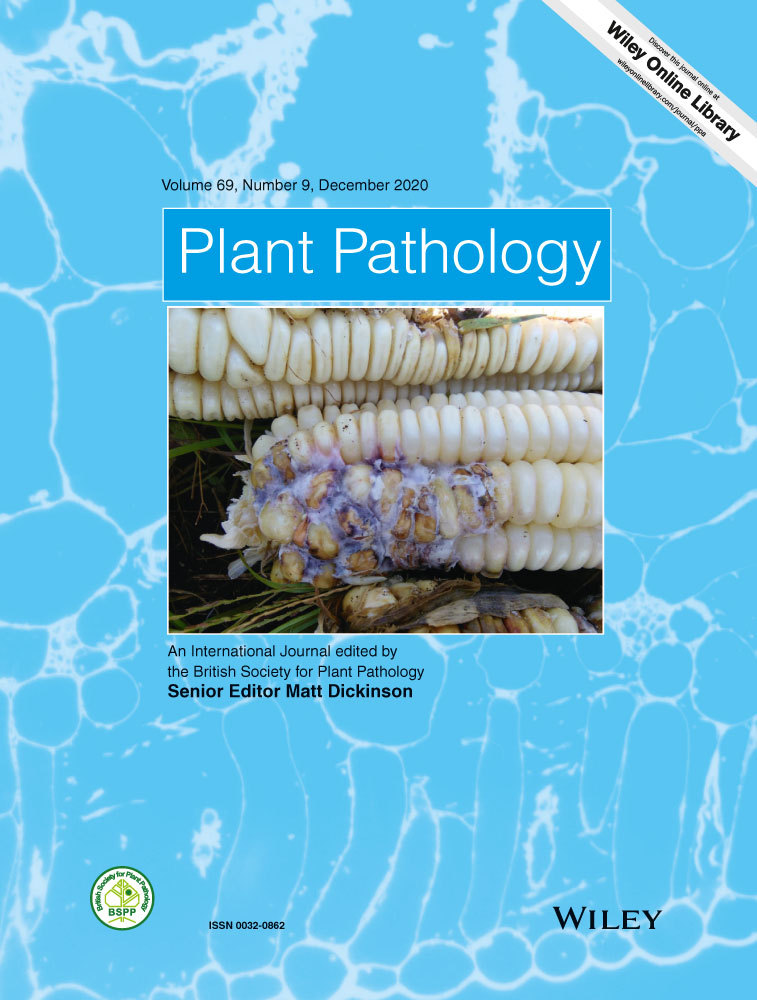Ver ítem
- xmlui.general.dspace_homeCentros e Institutos de InvestigaciónCICVyA. Centro de Investigación en Ciencias Veterinarias y AgronómicasInstituto de BiotecnologíaArtículos científicosxmlui.ArtifactBrowser.ItemViewer.trail
- Inicio
- Centros e Institutos de Investigación
- CICVyA. Centro de Investigación en Ciencias Veterinarias y Agronómicas
- Instituto de Biotecnología
- Artículos científicos
- Ver ítem
Fungicide resistance in Cercospora species causing cercospora leaf blight and purple seed stain of soybean in Argentina
Resumen
Cercospora species cause cercospora leaf blight (CLB) and purple seed stain (PSS) on soybean. Because there are few resistant soybean varieties available, CLB/PSS management relies heavily upon fungicide applications. Sensitivity of 62 Argentinian Cercospora isolates to demethylation inhibitor (DMI), methyl benzimidazole carbamate (MBC), quinone outside inhibitor (QoI), succinate dehydrogenase inhibitor (SDHI) fungicides, and mancozeb was determined in
[ver mas...]
Cercospora species cause cercospora leaf blight (CLB) and purple seed stain (PSS) on soybean. Because there are few resistant soybean varieties available, CLB/PSS management relies heavily upon fungicide applications. Sensitivity of 62 Argentinian Cercospora isolates to demethylation inhibitor (DMI), methyl benzimidazole carbamate (MBC), quinone outside inhibitor (QoI), succinate dehydrogenase inhibitor (SDHI) fungicides, and mancozeb was determined in this study. All isolates were sensitive to difenoconazole, epoxiconazole, prothioconazole, tebuconazole, and cyproconazole (EC50 values ranged from 0.006 to 2.4 µg/ml). In contrast, 51% of the tested isolates were sensitive (EC50 values ranged from 0.003 to 0.2 µg/ml), and 49% were highly resistant (EC50 > 100 µg/ml) to carbendazim. Interestingly, all isolates were completely resistant to azoxystrobin, trifloxystrobin, and pyraclostrobin, and insensitive to boscalid, fluxapyroxad, and pydiflumetofen (EC50 > 100 µg/ml). The G143A mutation was detected in 82% (53) of the QoI-resistant isolates and the E198A mutation in 97% (31) of the carbendazim-resistant isolates. No apparent resistance mutations were detected in the succinate dehydrogenase genes (subunits sdhB, sdhC, and sdhD). Mancozeb completely inhibited mycelial growth of the isolates evaluated at a concentration of 100 µg/ml. All Argentinian Cercospora isolates were sensitive to the DMI fungicides tested, but we report for the first time resistance to QoI and MBC fungicides. Mechanism(s) other than fungicide target-site modification may be responsible for resistance of Cercospora to QoI and MBC fungicides. Moreover, based on our results and on the recent introduction of SDHI fungicides on soybean in Argentina, Cercospora species causing CLB/PSS are insensitive (naturally resistant) to SDHI fungicides. Insensitivity must be confirmed under field conditions.
[Cerrar]

Autor
Sautua, Francisco José;
Doyle, Vinson P.;
Price, Paul P.;
Porfiri, Alejandro;
Fernandez, Paula Del Carmen;
Scandiani, María Mercedes;
Carmona, Marcelo Anibal;
Fuente
Plant Pathology 69 (9) : 1678-1694 (December 2020)
Fecha
2020-12
Editorial
Wiley
ISSN
0032-0862
1365-3059
1365-3059
Formato
pdf
Tipo de documento
artículo
Palabras Claves
Derechos de acceso
Restringido
 Excepto donde se diga explicitamente, este item se publica bajo la siguiente descripción: Creative Commons Attribution-NonCommercial-ShareAlike 2.5 Unported (CC BY-NC-SA 2.5)
Excepto donde se diga explicitamente, este item se publica bajo la siguiente descripción: Creative Commons Attribution-NonCommercial-ShareAlike 2.5 Unported (CC BY-NC-SA 2.5)

